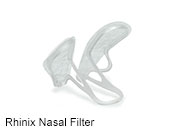- Are You Making This Expensive Thermostat Error This Winter?
- Recognizing the Signs of Hypothyroidism
- 10 Strategies to Overcome Insomnia
- Could Artificial Sweeteners Be Aging the Brain Faster?
- Techniques for Soothing Your Nervous System
- Does the Water in Your House Smell Funny? Here’s Why
- Can a Daily Dose of Apple Cider Vinegar Actually Aid Weight Loss?
- 6 Health Beverages That Can Actually Spike Your Blood Sugar
- Treatment Options for Social Anxiety Disorder
- Understanding the Connection Between Anxiety and Depression
Could ‘Nasal Filter’ Device Help Ease Allergies?


A new device that you wear in your nose — about the size of a contact lens and works like a miniature air filter for a furnace — might help filter out pollen and other allergens and keep them out of your sinuses.
A small study reports that this nasal filter could reduce daily sneezing by an average of 45 percent and daily runny nose by an average of 12 percent. The device, with the brand name Rhinix, is not yet commercially available.
“We found clinically relevant reductions in daily nasal symptoms with Rhinix compared to placebo, especially in sneezing, itching and runny nose symptoms,” said Peter Kenney, the study’s lead author.
Kenney, who’s a medical and doctoral student at Aarhus University in Denmark, is the inventor of the nasal filter. He’s the founder and CEO of the company that has filed an application for approval of the device by the U.S. Food and Drug Administration.
The filter is made up of a flexible frame that is inserted into both nostrils. There’s a filtering membrane on the frame for each nostril. A small plastic band is visible at the bottom of the nose between the nostrils.
“Depending on the filter’s density, it blocks specific particles in the air — including pollen from grass, which is one of the most frequent causes of hay fever,” Kenney said.
The study of the nasal filter included 24 people with a known allergy to grass pollen. They were exposed to a standardized amount of grass pollen for 30 minutes at a time until they had 210 minutes of exposure.
One time they wore the device without the filtering membrane (the placebo used for comparison). Another time they wore the device with the filtering membrane.
The total daily nasal symptoms scores were reduced by 21 percent in those wearing the device rather than the placebo, the study found.
Daily itching was decreased by 36 percent, and daily runny nose dropped by 12 percent. The reduction in daily sneezing was 45 percent, according to the study. Kenney also noted that throat irritation was reduced by 75 percent.
The study found no difference in airflow between those wearing the filter and those wearing the placebo, suggesting that wearing the nasal filter didn’t force people to breathe through their mouths.
The device is disposable and is meant to only be worn for a day, Kenney said. “Some people will probably use them for an entire day whereas others might just use them when they are in an exposed environment [such as a park],” he said.
Only one person in the study mentioned any concern about appearance, according to Kenney. He said that once people get used to wearing the nasal filters, they won’t notice them, much like people don’t notice wearing rings or contact lenses.
Kenney said because the filters aren’t yet in production, there’s no word yet on cost.
Dr. Mark Glaum, vice chair of the rhinitis, rhinosinusitis and ocular allergy committee of the American Academy of Allergy, Asthma and Immunology, said the nasal filter could be an option for someone who doesn’t have eye symptoms from their allergies.
“For certain individuals who want to try allergen avoidance rather than medications, this might be a more practical solution than wearing a mask. It’s less obvious and more cosmetically appealing than a mask,” he said.
“The changes in symptoms weren’t huge, but for people with just nasal symptoms, it might help to a degree. It wouldn’t do anything to improve eye symptoms though,” noted Glaum, who’s also an associate professor of medicine and pediatrics in the division of allergy and immunology at Morsani College of Medicine at the University of South Florida.
Glaum said he’d like to see the study repeated on a larger group of people to see if the results are similar. Kenney said a larger trial is already being planned.
The study was published as a letter to the editor in the March 7 online Journal of Allergy and Clinical Immunology.
More information
Learn more about seasonal allergies from the U.S. National Library of Medicine.
Source: HealthDay
Copyright © 2026 HealthDay. All rights reserved.










